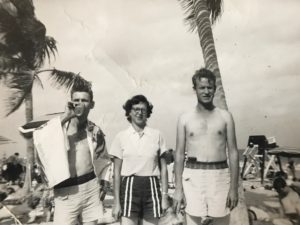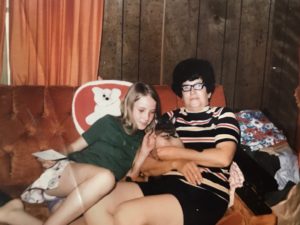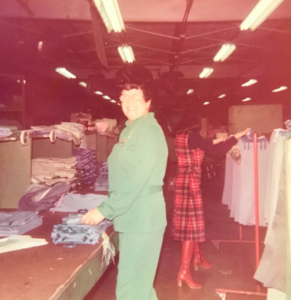
This is one of the sections I couldn’t fit into my essay in The Guardian about my mother’s illiteracy, poverty and fierce pride:
My mother was sullen as Daddy drove us all to the Neshoba County dump to do something that damaged the fierce pride of a smart woman who had never attended school a day in her life. The sun was dropping low in the sky, suggesting that the scorching Mississippi day might get a little cooler before her dreaded duty ensued.
Mama, with her jet-black hair disheveled, stared out the passenger window of the turquoise Chevrolet. My father and his brothers, all younger, had managed to keep the car running so he could continue his restless jaunts around the dry county, from odd jobs, to illegal beer joints to some bootlegger’s house. He was a hard worker when he worked, but he couldn’t stay in one place long.
Daddy soon turned into the county dump near Dr. Leigh’s dogtrot house where we had lived for a bit and he had broken her arm a few years back. I was in the backseat next to Ma Coates, Mama’s quiet mother with the dark complexion and an always-stern face who, since her own abusive husband had died in 1960, would live for weeks or months with one of her grown kids. She couldn’t read, write, do any math or even dial the telephone. She often landed with my mother, her only daughter, and she and I were buddies, although I talked more.

By then in her seventies, Ma Coates presented herself with dignity, daily winding her long, straight silver hair that hit her mid-back into an austere low bun held together with pungent VO5 hair gel and pins she kept in her heavy chifforobe that moved every time she did, to her children’s chagrin. She always wore her homemade polyester dresses that hit mid-calf and covered her elbows along with an inexpensive brooch on the top right side of the dress. She was dressed in her usual elegance that day.
Ma Coates often went along with mama and daddy when they drove places, ostensibly to tend to my sassy, antsy self, at least before I learned to read books to calm me down. I would understand later that she also went to watch over my mother.
As we stopped, I inhaled a combination I can still conjure today—rotting meat, baby diapers, chemicals and smoke. I was maybe 5 that hot day in what I’d guess now was 1966.
“Eww!” I cried out, dramatically holding my nose at the fumes from the open dump.
“Hush up, Donner Kay,” Mama told me quietly. “You’ll get used to it.”
I surveyed the dystopian mountains of trash, some calmly smoldering, with both trepidation and the excitement of wanting to dig for treasures. Most of the piles were large, with pieces of broken furniture sticking out here and there. I could see bottles, beer cans, broken toys, and other people—black, Choctaw, white—poking into mounds with sticks.
The dump backed up to the western border of what white people in my hometown of Philadelphia, Mississippi, called the “n*gger quarters.”

Daddy jumped out. “Come on, Katie Mae,” he told mama. She got out, and Ma Coates followed suit. “Stay in the car, Donner Kay.” He got sticks out of the trunk, and I watched the women gingerly walk forward to look for metal Daddy could sell. They bent over, picking up small items and dropping them into his box.
I flipped my skinny body over the front seat to get a better view. I soon slid behind the steering wheel to pretend drive. I pulled the gear handle down as a big N popped up in front of me. The Chevrolet lurched forward. We were on a slight hill, and the car started rolling. I was driving straight at my elders, my hands on the steering wheel, jerking it back and forth.
“Katie Mae! Ma Coates! Move! Donner Kay’s driving the car!” Daddy yelled.
They jumped away as the Chevrolet plowed toward the pile of garbage in my direct path and hit the smoky mound as I ground to a halt. I sprang forward, somehow not hitting my head. Mama grabbed me out and started to swat my bottom as I cried.
“We all coulda been killed!” she yelled as Daddy backed the car out of the heap.
The next day, we all got in the Chevrolet and drove the 40 miles south to Meridian where Daddy pulled up to a scrap-metal business under a bridge next to the train tracks. Mama stared straight ahead as he got out with his box. She hated these trips for daddy to sell dump metal to help keep us in our latest rental house and the lights on, and to have beer, gas and gambling money in his pocket, but she had no choice. She had not yet become the chief breadwinner by ironing, hemming and folding pants, so Daddy made her help with his freelance pursuits.
It may have been another of Daddy’s adventures for me, but her vicious pride could barely stand it. Years later, I returned home as an adult with a boyfriend in tow. As we drove by the dump, I casually said without thinking, “That’s where we used to pick up metal.”
My mother was mortified, turning maroon-red with shame. I didn’t make that mistake again.
Your mother must have been very intelligent to have survived and flourished like she did — and to have spawned you. You, no doubt, have inherited her strong will and tenacity. She was a good inspiration for you, whether you realized it or not.
Thank you. And I’ve long realized it. She was my hero since I was a kid. Her illiteracy and hustle to make it no matter what, and support me, taught me that fast. I remember her rolling her nickels to buy me an Easter basket, putting my school clothes on layaway, and what it took to buy me a class ring. A boyfriend lost it when I was at Mississippi State, after begging to wear it on his damn pinkie. I’ll never forget that.